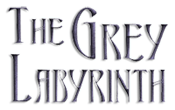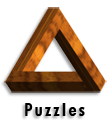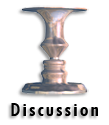| |
|
|
|
|
|
|
Three Chestnuts
by Kevin J. Lin
Ancient Chestnut #1:
This classic is a simple wording deception that occurs in the last sentence:
"Now each of the men paid $9.00 for the room, for a total of $27.00.
The bellhop has $2.00. 27+2=29. What happened to the missing dollar?"
There is no missing dollar, the arithmetic above makes no sense in the
context of the problem. There's no reason to add the two dollars the bellboy
kept to the nine dollars each of the men spent. Each man paid nine dollars
for a total of twenty-even dollars. Of that twenty-seven, two went to
the bell boy, twenty-five went to the hotel. The equation should be: 27-2=25,
the price of the room.
Ancient Chestnut #2:
Alas, this seemingly simple geometry problem has no solution. At least,
no solution in Euclidean space without resorting to tricks: http://mathworld.wolfram.com/UtilityGraph.html.
On the other hand, the problem does have some "trick" solutions,
such as using non-Euclidean space or embedding one utility within another.
Ancient Chestnut #3
Like Chestnut #3, this one has no non-trick solution either. Rest assured,
if you've tortured yourself looking for a third, common English word ending
in "gry" it definitely does not exist. A simple scripted program
running through comprehensive dictionaries will yield dozens of words
ending in "gry", but aside from hungry and angry, none could
be considered everyday by any stretch of the imagination (see below).
There are a number of variant wordings to the puzzle which allow for
possible trick answers. All depend on specific wordings or grammar, or
on speaking the puzzle aloud. For example a phrasing with: "...there
are only three words in the English language..." might claim the
answer is "language". The problem with this, and all like solutions
depend on speaking the riddle aloud. In writing, for that solution to
be considered correct, it would need to be printed "there are only
three words in 'the English language'", which would kill the puzzle.
All of the other trick answers are equally unsatisfying.
Where did this puzzle originate? No one knows, but it dates back at least
20 years, and likely either originated as a hoax or as a deceptive riddle
based on one of the variant specific phrasings.
And now, 100 real-live gry words, from the rec.puzzles FAQ:
- aggry [OED:1:182; W2; W3]
- Agry Dagh (Mount Agry) [EB11]
- ahungry [OED:1:194; FW; W2]
- angry [OED; FW; W2; W3]
- anhungry [OED:1:332; W2]
- Badagry [Johnston; EB11]
- Ballingry [Bartholomew:40; CLG:151; RD:164, pl.49]
- begry [OED:1:770,767]
- bewgry [OED:1:1160]
- bowgry [OED:1:1160]
- braggry [OED:1:1047]
- Bugry [TIG]
- Chockpugry [Worcester]
- Cogry [BBC]
- cony-gry [OED:2:956]
- conyngry [OED:2:956]
- Croftangry [DFC, as "Chrystal Croftangry"]
- dog-hungry [W2]
- Dshagry [Stieler]
- Dzagry [Andree]
- eard-hungry [CED (see "yird"); CSD]
- Echanuggry [Century:103-104, on inset map, Key 104 M 2]
- Egry [France; TIG]
- ever-angry [W2]
- fire-angry [W2]
- Gagry [EB11]
- gry (from Latin _gry_) [OED:4/2:475; W2]
- gry (from Romany _grai_) [W2]
- haegry [EDD (see "hagery")]
- half-angry [W2]
- hangry [OED:1:329]
- heart-angry [W2]
- heart-hungry [W2]
- higry pigry [OED:5/1:285]
- hogry [EDD (see "huggerie"); CSD]
- hogrymogry [EDD (see "huggerie"); CSD (as "hogry-mogry")]
- hongry [OED:5/1:459; EDD:3:282]
- huggrymuggry [EDD (see "huggerie"); CSD (as "huggry-muggry")]
- hungry [OED; FW; W2; W3]
- Hungry Bungry [Daily Illini, in ad for The Giraffe, Spring 1976]
- iggry [OED]
- Jagry [EB11]
- kaingry [EDD (see "caingy")]
- land-hungry [OED; W2]
- leather-hungry [OED]
- Langry [TIG; Times]
- Lisnagry [Bartholomew:489]
- MacLoingry [Phillips (as "Flaithbhertach MacLoingry")]
- mad-angry [OED:6/2:14]
- mad-hungry [OED:6/2:14]
- magry [OED:6/2:36, 6/2:247-48]
- malgry [OED:6/2:247]
- man-hungry [OED]
- Margry [Indians (see "Pierre Margry" in bibliog., v.2, p.1204)]
- maugry [OED:6/2:247-48]
- mawgry [OED:6/2:247]
- meagry [OED:6/2:267]
- meat-hungry [W2]
- menagry [OED (see "managery")]
- messagry [OED]
- nangry [OED]
- overangry [RH1; RH2]
- Pelegry [CE (in main index as "Raymond de Pelegry")]
- Pingry [Bio-Base; HPS:293-94, 120-21]
- podagry [OED; W2 (below the line)]
- Pongry [Andree (Supplement, p.572)]
- pottingry [OED:7/2:1195; Jamieson:3:532]
- puggry [OED:8/1:1573; FW; W2]
- pugry [OED:8/1:1574]
- rungry [EDD:5:188]
- scavengry [OED (in 1715 quote under "scavengery")]
- Schtschigry [LG/1:2045; OSN:97]
- Seagry [TIG; EB11]
- Segry [Johnston; Andree]
- self-angry [W2]
- self-hungry ?
- Shchigry [CLG:1747; Johnson:594; OSN:97,206; Times:185,pl.45]
- shiggry [EDD]
- Shtchigry [LG/1:2045; LG/2:1701]
- Shtshigry [Lipp]
- skugry [OED:9/2:156, 9/1:297; Jamieson:4:266]
- Sygry [Andree]
- Tangry [France]
- Tchangry [Johnson:594; LG/1:435,1117]
- Tchigry [Johnson:594]
- tear-angry [W2]
- tike-hungry [CSD]
- Tingry [France; EB11 (under "Princesse de Tingry")]
- toggry [Simmonds (as "Toggry", but all entries are capitalized)]
- ulgry [Partridge; Smith:24-25]
- unangry [OED; W2]
- vergry [OED:12/1:123]
- Virgy [CLG:2090]
- Wirgy [CLG:2090; NAP:xxxix; Times:220, pl.62; WA:948]
- wind-angry.
- wind-hungry [W2]
- yeard-hungry [CED (see "yird")]
- yerd-hungry [CED (see "yird"); OED]
- yird-hungry [CED (see "yird")]
- Ymagry [OED:1:1009 (col. 3, 1st "boss" verb), (variant of "imagery")]
This list was gathered from the following articles:
George H. Scheetz, In Goodly Gree: With Goodwill, Word Ways 22:195 (Nov.
1989)
Murray R. Pearce, Who's Flaithbhertach MacLoingry?, Word Ways 23:6 (Feb.
1990)
Harry B. Partridge, Gypsy Hobby Gry, Word Ways 23:9 (Feb. 1990)
A. Ross Eckler, -Gry Words in the OED, Word Ways 25:4 (Nov. 1992)
References:
(Many references are of the form [Source:volume:page] or [Source:page].)
Andree, Richard. Andrees Handatlas (index volume). 1925.
Bartholomew, John. Gazetteer of the British Isles: Statistical and
Topographical. 1887.
BBC = BBC Pronouncing Dictionary of English Names.
Bio-Base. (Microfiche) Detroit: Gale Research Company. 1980.
CE = Catholic Encyclopedia. 1907.
CED = Chambers English Dictionary. 1988.
Century = "India, Northern Part." The Century Atlas of the World.
1897, 1898.
CLG = The Colombia Lippincott Gazetteer of the World. L.E.Seltzer, ed.
1952.
CSD = Chambers Scots Dictionary. 1971 reprint of 1911 edition.
Daily Illini (University of Illinois at Urbana-Champaign).
DFC = Dictionary of Fictional Characters. 1963.
EB11 = Encyclopedia Britannica, 11th ed.
EDD = The English Dialect Dictionary. Joseph Wright, ed. 1898.
France = Map Index of France. G.H.Q. American Expeditionary Forces. 1918.
FW = Funk & Wagnalls New Standard Dictionary of the English Language.
1943.
HPS = The Handbook of Private Schools: An Annual Descriptive Survey of
Independent Education, 66th ed. 1985.
Indians = Handbook of American Indians North of Mexico. F. W. Hodge. 1912.
Jamieson, John. An Etymological Dictionary of the Scottish Language. 1879-87.
Johnston, Keith. Index Geographicus... 1864.
LG/1 = Lippincott's Gazetteer of the World: A Complete Pronouncing Gazetteer
or Geographical Dictionary of the World. 1888.
LG/2 = Lippincott's New Gazetteer: ... 1906.
Lipp = Lippincott's Pronouncing Gazetteer of the World. 1861, undated
edition from late 1800's; 1902.
NAP = Narodowy Atlas Polski. 1973-1978 [Polish language]
OED = The Oxford English Dictionary. 1933. [Form: OED:volume/part number
if
applicable:page]
OSN: U.S.S.R. Volume 6, S-T. Official Standard Names Approved by the United
States Board on Geographic Names. Gazetteer #42, 2nd ed. June 1970.
Partridge, Harry B. "Ad Memoriam Demetrii." Word Ways, 19 (Aug.
1986): 131.
Phillips, Lawrence. Dictionary of Biographical Reference. 1889.
RD = The Reader's Digest Complete Atlas of the British Isles, 1st ed.
1965.
RH1 = Random House Dictionary of the English Language, Unabridged. 1966.
RH2 = Random House Dictionary of the English Language, Second Edition
Unabridged. 1987.
Simmonds, P.L. Commercial Dictionary of Trade Products. 1883.
Smith, John. The True Travels, Adventvres and Observations: London 1630.
Stieler, Adolph. Stieler's Handatlas (index volume). 1925.
TIG = The Times Index-Gazetteer of the World. 1965.
Times = The Times Atlas of the World, 7th ed. 1985.
W2 = Webster's New International Dictionary of the English Language,
Second Edition, Unabridged. 1934.
W3 = Webster's Third New International Dictionary of the English Language,
Unabridged. 1961.
WA = The World Atlas: Index-Gazetteer. Council of Ministires of the USSR,
1968.
Worcester, J.E. Universal Gazetteer, Second Edition. 1823.
|
|
Copyright © 1996-2025 Wx3, All Rights Reserved.
|
|
|
|





